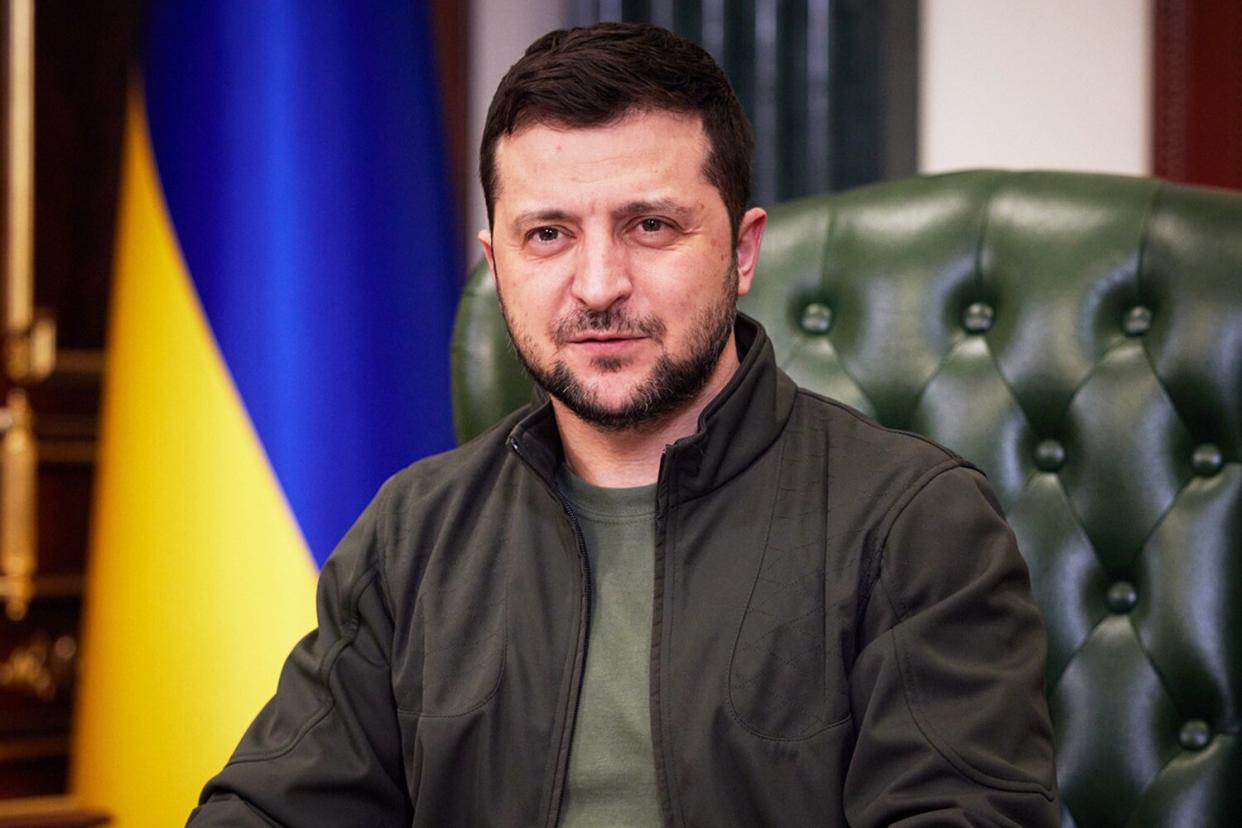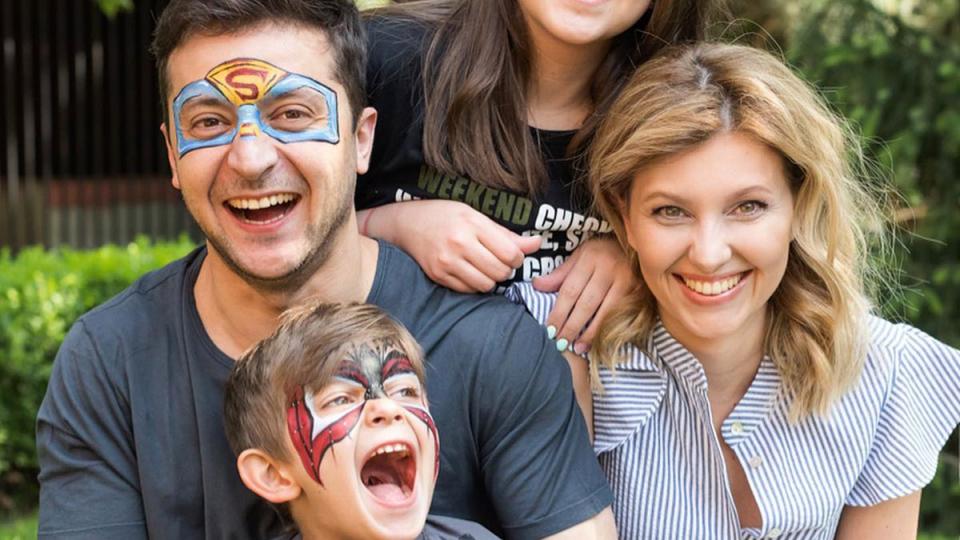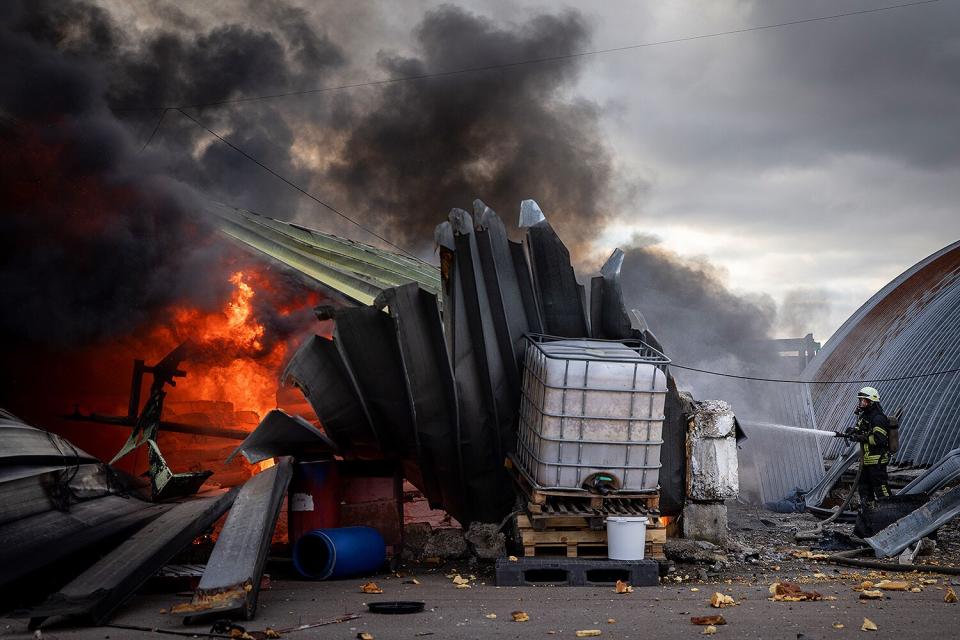Zelenskyy Remembers How His Family Woke Him Up to Say a War Had Started

- Oops!Something went wrong.Please try again later.
- Oops!Something went wrong.Please try again later.
In a new interview from the fortified location his staff calls "the fortress" — given while he remains in his country amid Russia's invasion — Ukraine's President Volodymyr Zelenskyy described the very first moments he realized his country was under attack:
When he was woken up in the middle of the night to news of explosions.
"I was in Kyiv [the capital], in the house, at the residence. I was home at that moment. It was 04:50 a.m.," Zelenskyy, 44, told The Economist in an interview published Sunday. "With my wife and kids. They woke me up. They told me there were loud explosions. After a couple of minutes, I received the signal that a rocket attack was under way."
He continued: "We understood that the Russians could attack, but we didn't understand the magnitude."
Speaking to The Economist, Zelenskyy admitted, "None of us was ready for the war before it began." Still, he said he's "sure" Ukraine will win.
Zelenskyy — a married father-of-two who was a popular actor and comedian before being elected president in Ukraine — has become something of a folk hero in the weeks since Russian forces launched a large-scale invasion on Feb. 24
His selfie videos from the capital, in which he vows to continue the fight, have gone viral. As have his comments to the international community, as when he rebuffed a U.S. offer to evacuate him: "I need ammunition, not a ride."

Ukrainian Presidency/Handout/Anadolu Agency via Getty Ukrainian President Volodymyr Zelenskyy
RELATED: How Ukraine's President Zelenskyy Transformed from Popular Comedian to Wartime Leader
But Zelenskyy was quick to tell The Economist this week that he feels he isn't a "hero" — just a leader with a desire to "change attitudes" about his home country.
"That's why I'm saying that I am not a hero," he said. "I understood what was going on. I wanted to change attitudes towards Ukraine. On one level it's not about who has more weapons or more money or gas, oil etc. That's why we have to have agency. That's the first thing that I understood."
While the two countries have been attempting peace talks — so far unsuccessful — Zelenskyy told The Economist it's unclear what sort of communications Russian President Vladimir Putin is having with his own officials, as politicians often exist in "an information vacuum."
"What we see is that this is a closed atmosphere with Putin now. .... That means he can't understand or he couldn't know what's going on outside," Zelenskyy said, adding: "Even me, if I were sitting in the office and I don't go outside for three or four days, I would not have correct information about what is going on in the world."
Elsewhere in his conversation with the magazine, Zelenskyy said he believes Putin, 69, has been "in information isolation getting fed information by his coterie" for decades and doesn't realize how much Ukraine has changed over the past 30 years, since the collapse of the Soviet Union.
"The way he sees Ukraine is very different from the Ukraine that actually exists in real life," he said.
Later in the interview, Zelenskyy said Putin was "throwing Russian soldiers like logs into a train's furnace," alluding to reports that some 15,000 Russian soldiers have died in Ukraine in the last month of fighting.
"They are not even burying them," Zelenskyy said. "They are not burying them at all. Their corpses are left in the streets. In several cities, small cities, our soldiers say it's impossible to breathe because of the smell. It is the stench of rotting flesh. It's a complete nightmare."
Ukraine, meanwhile, wants to protect its own, he said.

olenazelenska_official/Instagram Ukrainian President Volodymyr Zelensky, wife Olena Zelenska and their two children
"We believe in victory. It's impossible to believe in anything else. We will definitely win because this is our home, our land, our independence. It's just a question of time," he told The Economist.
Victory, he added wouldn't necessarily be about controlling Ukraine's land but about saving "as many lives as possible ... Our land is important, yes, but ultimately, it's just territory."
His decision not to leave Ukraine, he said, was to signal to others "how we should respond to the attack."
"It's about how the war started and how it's going to end," he said. "It will end with us still standing here defending."
RELATED: Ukrainian President Volodymyr Zelenskyy Visits Teen Gunfire Victim in the Hospital: 'It Is Not Easy'
The invasion of Ukraine, ordered by Putin, has drawn condemnation around the world and increasingly severe economic sanctions against Russia.
Details of the fighting change by the day, but hundreds of civilians have already been reported dead or wounded, including children. More than 3.5 million Ukrainians have also fled, the United Nations says.
With NATO forces amassed in the region around Ukraine, various countries have also offered aid or military support to the resistance. Amid his calls for peace talks — so far unsuccessful — Zelenskyy has urged his country to fight back.

Chris McGrath/Getty Images The Russian invasion of Ukraine
Putin insists Ukraine has historic ties to Russia and he is acting in the best security interests of his country. Zelenskyy vowed not to bend.
"Nobody is going to break us, we're strong, we're Ukrainians," he told the European Union in a speech in the early days of the fighting, adding, "Life will win over death. And light will win over darkness."
The Russian attack on Ukraine is an evolving story, with information changing quickly. Follow PEOPLE's complete coverage of the war here, including stories from citizens on the ground and ways to help.

